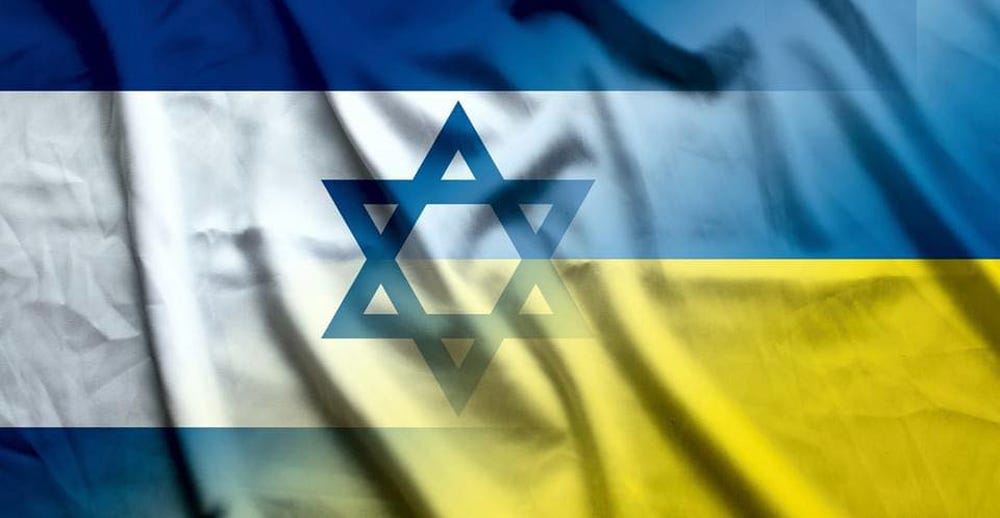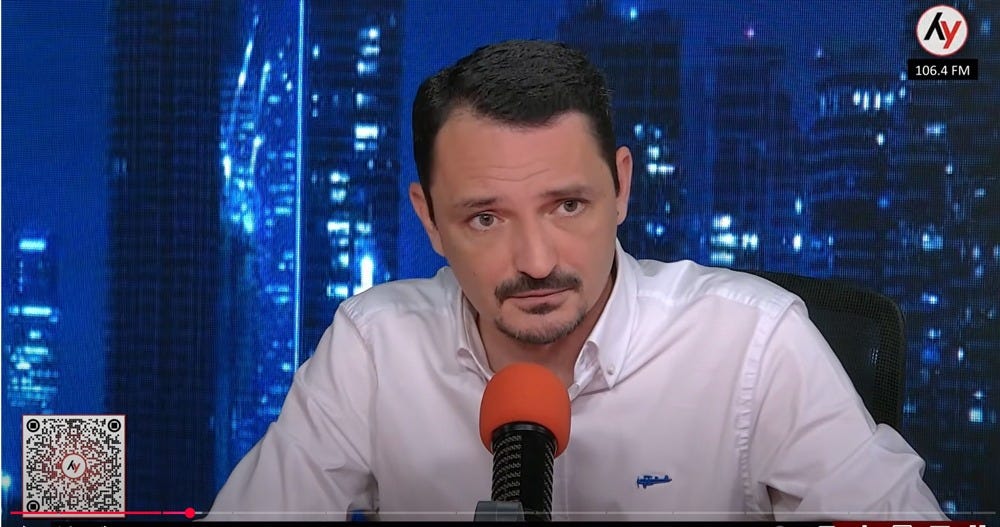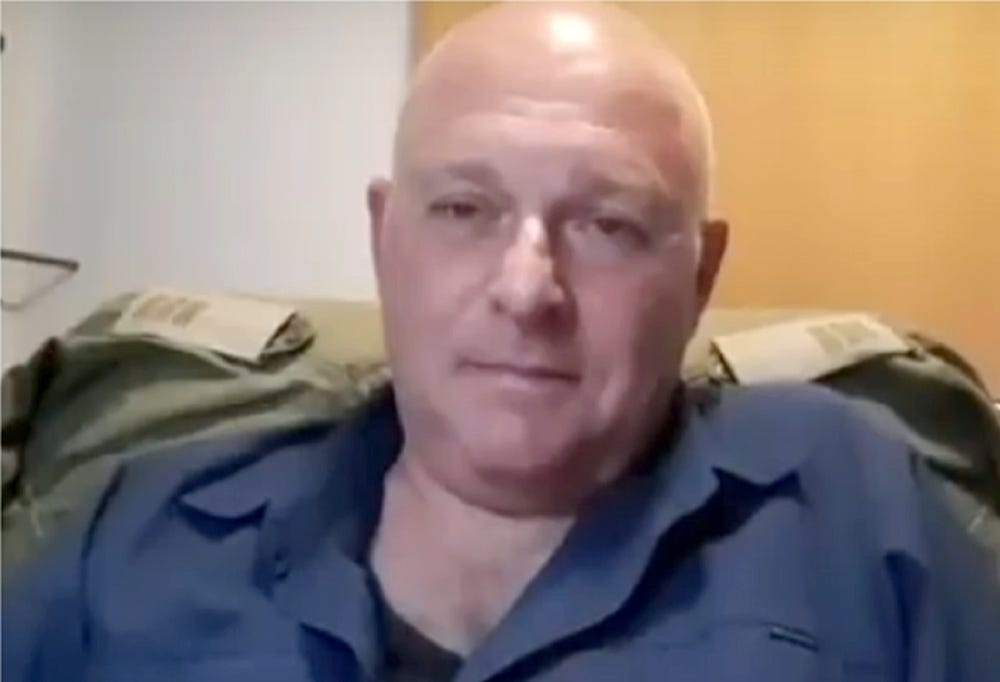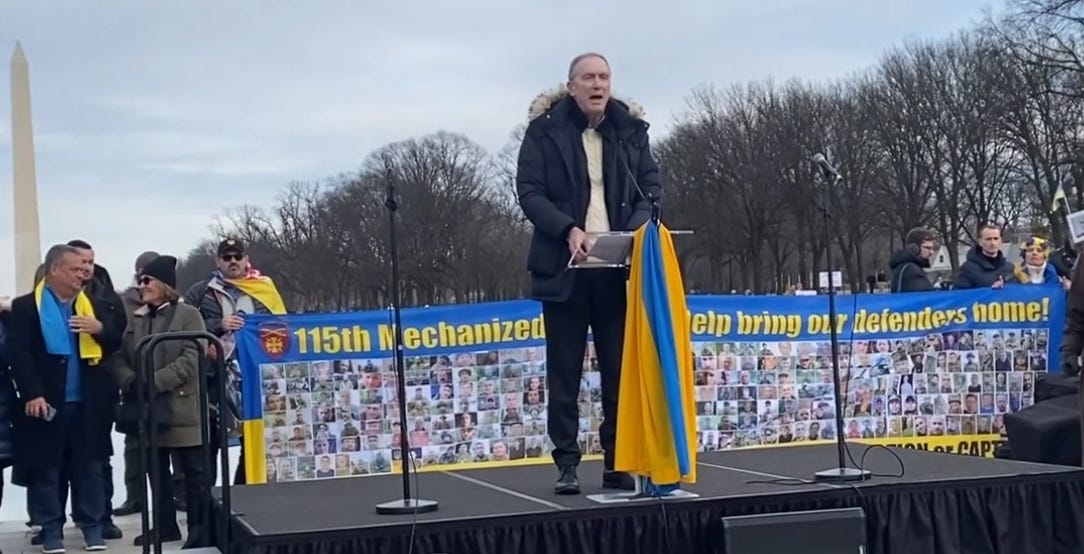In this Issue: Reaction to Israel’s Vote Against Ukraine in the United Nations; The American Jewish Community on the Third Anniversary of the Russian Invasion
“I consider this Action Immoral and Shameful”: Reaction to Israel’s Vote Against Ukraine in the United Nations
On Monday February 24, the United Nations General Assembly adopted a resolution which condemned Russia’s aggression against Ukraine, on the third anniversary of the full-scale invasion. The vote was 93 to 18, with the United States and Israel both voting against the resolution. Among the countries voting “no” were Russia, Belarus, North Korea and Hungary. China and Iran abstained. This was the first time that Israel refused to condemn the Russian aggression in a vote at the United Nations.
In an interview with “Yisrael Hayom”, Israeli Foreign Minister Gideon Sa’ar justified the vote on pragmatic political grounds. Israel needs to follow the Americans. “We are in coordination with the Americans, whereas most of the European states, with the exception of Hungary and Czechia, vote against us. I don’t know anyone else who is willing to impose a veto on our behalf in the Security Council.” Speaking with “Politico“, he stated that Israeli policy on the war has not changed: “We voted with the Americans, and I do believe that Russia is the aggressor. We haven't changed our mind, but we thought it is right to give a chance to the initiative of America to try to end this war and solve it by peaceful means.”
The Israeli vote at the United Nations aroused strong emotions among immigrants from Russia and Ukraine in Israel. Below are a few selections.
Intellectuals on the Air in Haifa
The Haifa-based Russian language radio station Luchshee Radio interviewed Professor Viktor Vakhshtayn, a native of Penza, Russia, on February 25, the day after the vote. Vakhshtayn is a sociologist, who was a professor and dean at the Moscow School of Social and Economic Sciences. He left for Israel in the fall of 2021, when repressive actions were taken against the school and its rector. In Israel, he has joined the faculty of Tel Aviv University. Vakhshtayn was interviewed by the radio station’s editor in chief Vitaly Novoselov, a native of Perm, Russia.
Vitaly Novoselov, Luchshoe Radio: Israel has voted against Ukraine in the United Nations, together with Russia. With the United States of course, but together with Russia. I don’t know how you experienced this, my colleagues, but I had a flashback to February 24, 2022. Back then I felt unbearably ashamed, ashamed of Russia. And yesterday I felt unbearably ashamed of Israel. Everyone understands the rationales. [Newscaster] Zvi Zilber explained them: “We can’t vote differently than the United States. For us, our own security is the number one priority. The rest isn’t that important.” One can understand those things rationally, but on the emotional level, it seems to me that the vote by the United States and Israel against Ukraine, and for Russia, is an immoral act.
Viktor Vakhshtayn: Let me begin by saying that as a human being and citizen, as a “foreign agent” [in Russia – DEF] and as a new ‘oleh [immigrant to Israel], I also consider this decision immoral and shameful. Yes, it may be politically motivated, rational, and strategically justified. But that doesn’t make it any less immoral. […]
But let’s take a step back and ask the question: Why do we have such a strong reaction? For me too, it reminded me of my feelings on February 24th [2022]. I was already in Israel, and the sense of shame was absolutely unbearable. The feeling that I’m lucky that I’m in Israel didn’t leave me all day. If I had been in Russia, I would have fallen into clinical depression. Today I feel shame [about Israel’s vote], though I wouldn’t compare it to the level that I felt three years ago. […]
To understand the different models of reaction to this vote by Israel, we need to look at how people interpreted this event in Israeli public discourse. Some say: “How many times did Ukraine vote against Israel in the UN? Not only the recognition of the Palestinian Autonomy, but also the declaration that Ukraine will do what it can to hold Israel responsible in the Hague.” But let’s put that argument aside because that’s a form of rationalization. A defense-mechanism. The second defense mechanism is that votes in the UN don’t mean anything. Azerbaijan always votes against Israel so as not to quarrel with the Muslim world, but it is still our ally and partner. We shouldn’t attribute significance to this vote. […] But the fact that people express such rationalizations indicates that we do attribute significance to such votes.
But for other people, like us, this is a blow to our view of the world.
Vitalii Novoselov: On my Facebook page, on the cover-page, I have the Israeli and Ukrainian flags. It seems that Trump has the Israeli and Russian flags.
Viktor Vakhshtayn: Let’s explain what part of our identity was desecrated. This was very accurately formulated by Natan Sharansky, who in his reaction to the vote revived the concept of the free world. He said: President Trump, you were against the anti-Israeli, anti-Zionist Leftist obscurantism; we believed you would return the world to common sense. But today you killed Navalny for a second time. The betrayal of Zelensky is equivalent to the killing of Navalny, he said.
[…] He used the phrase “the free world”. People who emigrated here in the 1970s remember this phrase. For the generation of my parents, for political prisoners, dissidents – this combination of words was not just a propagandistic cliché. [..] People like you, who hung up the Israeli and Ukrainian flags on Facebook, believe that our war [in Israel] and the Ukrainian war were two fronts of the same war. That the free world exists. There are countries that share common notions, not so much about democracy, but about human dignity, freedom, choice and responsibility. About truthful statements. This collection of common values forged these countries into a single global world, which can be called free. But now we are told by Gideon Sa’ar [Israel’s Foreign Minister] a bit abusively, “We need to do everything to stop the war [in Ukraine]”. Sa’ar, you just stomped on people who said exactly the same thing about our war [against Hamas]!
Sharansky is telling us that the free world has ceased to exist. You [Trump] have killed the idea that there are countries that share a minimal common conception about good and evil. You’re now saying, “well not really. This isn’t one war. It’s two different wars.”
This term, ‘the free world”, became a propagandistic cliché during the Cold War. And after the fall of the Iron Curtain, it fell into disuse. But after February 24 [2022] and October 7 [2023], the term took on a new life. People who wear the Israeli and Ukrainian flags on their lapels believe deeply that the two are part of a great global war. No rational argument that “we have our own problems”, or “the last thing we need is to quarrel with America” can convince people when it has to do with their identity and their view of the world.
Military Analyst Grigory Tamar in Tel Aviv.
52-year old Grigory Tamar was born in Omsk, Russia. He made Aliyah in 1990, and reached the rank of captain in the Israel Defense Forces before retiring to civilian life. In recent years, he has become a popular military analyst on Ukrainian television. He issued the following statement on his You Tube channel.
When Ukraine supported anti-Israel resolutions in the United Nations, very many citizens of Ukraine wrote to me that they were ashamed of the government of Ukraine for expressing an anti-Israel position. Today it is my turn to apologize to the people of Ukraine for the action of my government. I felt burning shame when I found out that Israel did not support a pro-Ukrainian resolution at the UN, and instead was among the 18 countries who, together with Russia, contested this resolution. […] I understand that Israel is under unprecedented political pressure from enemies of the Jewish people and of the Israeli people across the globe, pushing us into a corner. But that cannot excuse the action by our government in this case. I want to express my endless, deeply felt support for the Ukrainian people. I believe a time will come when both our peoples and our governments will cooperate closely.
Again, I ask that you forgive the action by our government. I am certain that it will not have any practical significance. And I wish Ukraine victory in its just struggle for its sovereignty.
In an interview on Ukrainian television, Tamar reiterated these sentiments and added:
Unfortunately, Israel has lost its sovereignty. We are totally a satellite of the United States. Specifically, we are hostages to Trump’s good will. Whatever America says we do. We didn’t even abstain from the vote.
The American Jewish Community on the Third Anniversary of the Russian Invasion
When Russia invaded Ukraine in 2022, a wide range of American Jewish organizations expressed solidarity with Ukraine. Today, only a handful of organizations remain engaged with the issue. Even though public attention to the Ukraine issue has grown in the past few weeks, in reaction to the abrupt about-face in American policy, there is no comparable growth of interest in the American Jewish community.
I checked the websites of every major Jewish organization I could think of, and I found a total of two statement of political support for Ukraine on the third anniversary.
The American Jewish Committee, certainly a major player, issued a strong and thoughtful statement. It read in part:
“American Jewish Committee (AJC) reaffirms unwavering solidarity with Ukraine and the Ukrainian people. [..] Russia’s continued illegal war, its efforts to undermine European stability and unity, and its ever-deepening alignment with Iran, China, and North Korea all pose grave threats to American and European interests, democracy, and the Jewish people. The risks of a power axis that embraces the Iranian regime and furthers its ability to jeopardize the security of the State of Israel and the stability of the Middle East cannot be ignored.”
The National Coalition Supporting Eurasian Jewry (NCSEJ) represents American Jewry on issues related to Eurasia (the countries formerly in the Soviet Union). It came out with a statement in response to Trump’s anti-Ukrainian rhetoric a few days before the third anniversary:
“NCSEJ is concerned over the negative rhetoric regarding Ukraine emanating from the current administration. As we approach the third anniversary of Russia’s unprovoked brutal invasion of Ukraine, there is no question that Russia attacked Ukraine in 2022 in a major escalation of the war, which they initially started in 2014.
Russia’s invasion of Ukraine unleashed devastation that has ruined hundreds of thousands of lives. Cities lie in ruins and millions have been displaced. It is the largest and deadliest conflict in Europe since World War II.
NCSEJ supports President Trump’s initiative to find a diplomatic solution to end the war. Any diplomatic effort must include all the parties of the conflict to find a just and fair solution that respects the independence, territory, and security of Ukraine.”
NCSEJ’s Executive Director, Mark Levin, also spoke at a rally for Ukraine in Washington on Saturday February 22, alongside Ukrainian Ambassador Oksana Markarova.
Otherwise, the American Jewish community was silent – The World Jewish Congress, the Anti-Defamation League, The Jewish Federations of North America, the lay and rabbinic arms of the Orthodox, Conservative and Reform denominations, Bnai Brith, the Jewish Council on Public Affairs, the Workers’ Circle, etc., etc.
Of the two statements that were issued, I prefer the AJC one, because it mentions that there is a Jewish interest at stake in Ukraine: Russia has forged a military alliance with Iran. If more Jewish organizations understood this, they would do more, or at least say more, in support of Ukraine. But some how the message has not gotten through that Russia has financed and backed Hamas, has armed Hezbollah in Lebanon, and provides air-defense systems and other technology to Iran. Somehow, the antisemitic statements by Putin and Foreign Minister Sergei Lavrov - against Zelensky and against Israel – do not alarm most American Jewish organizations, and do not motivate them to take a stand.
On the other hand, Jewish philanthropic agencies used the anniversary to remind their supporters of the work they do in Ukraine. The Joint Distribution Committee issued a press release that offered the following statistics on its aid in Ukraine since the start of the war. The organization has assisted 55,500+ vulnerable Jews in Ukraine since the start of the crisis, provided 40,000+ refugees with vital necessities in Romania, Moldova, Poland, and Hungary, helped 6,200+ internally displaced persons (IDPs), and distributed 800+ tons of humanitarian aid.
UJA-Federation of New York posted an update “Three Years Later - Our Response to the War in Ukraine”. It reported that of the $26 million it had allocated in emergency funding, 40% went to Ukraine. (Unfortunately, the update doesn’t clarify the time frame for the numbers. During the last three years? During the last year?)
The International Fellowship of Christians and Jews probably should not be counted as a Jewish organization. (It’s donor-base id Evangelicals.) But it is a major funding agency for Jews in Ukraine. IFCJ published a release on the third anniversary of the war quoting CEO Yael Eckstein “Thanks to our hundreds of thousands of supporters worldwide who value and sanctify life, we will continue to pray for peace, and we will continue to provide hope and light in a war that has meant darkness for so many.” The organization provided “impact numbers”. But since JDC and IFCJ collaborate, presumably most of these numbers duplicate each other.
In short, the American Jewish community is having more of an impact in the humanitarian sphere than in the political sphere when it comes to the Russian war against Ukraine.







